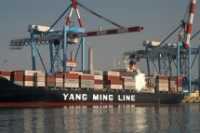EIB loan will benefit some 400 projects with a focus on investments in areas populated by low income groups. The wastewater reuse component will make up to 200 million cubic meters per year
On 27 and 28 December, Philippe de Fontaine Vive, EIB Vice-President responsible for economic and financial support to the Euro-Mediterranean region, signed two loan contracts, highlighting the EIB’s commitment to financing pollution abatement and supporting Small and Medium sized Enterprises (SMEs).
EIB Vice-President visit to israel was made possible following the Government of Israel’s ratification, on 7 December, of the EIB-Israel Framework Agreement.
The first loan agreement of EUR 200 million was signed with the Ministry of Finance and will finance protection of the environment through municipal wastewater schemes.
The agreement with the Finance Ministry to extend a 200 million euro loan designated for financing waste water treatment in local authorities with fewer than 200,000 residents
The second loan of EUR 75 million was signed with Bank Hapoalim and will underpin capital investment projects of private sector Small and Medium sized Enterprises.
EIB’s Environmental Programme Loan will be used for the construction of new wastewater treatment plants, wastewater re-cycling projects and related schemes. Beneficiaries will be municipalities or municipal companies, with a focus on smaller urban and rural centres, from a few thousand to about 200.000 equivalent populations. In total, EIB loan will benefit some 400 projects with a focus on investments in areas populated by low income groups. The wastewater reuse component will make up to 200 million cubic meters per year.
The bank extends loans on the basis of two criteria aside from economic feasibility: the added value the loan could provide in comparison to loans from other sources in the market, and proper management of the project tender. Investment goals need to meet targets set by the EU's Barcelona Program, which include creating jobs and protecting the environment.
EIB to finance projects in Israel
EIB loan will benefit some 400 projects with a focus on investments in areas populated by low income groups. The wastewater reuse component will make up to 200 million cubic meters per year
02.01.07 / 00:00
•
More articles that may interest you

Israel's Ben-Gurion airport – plans approved to build a Muslim Prayer Room

Transportation Minister: Royal Jordanian to be able to increase flights to Tel Aviv

Israel, Jordan upgraded QIZ trade pact

APL adds Israel to Its Worldwide Network

First Yang Ming Line container ship in Ashdod

Ashdod port: container movements in January - November up 18%
More news from Industry & Trade Section
>Israel, Jordan upgraded QIZ trade pact/25.12.06
>Israel's Balance of Payments Surplus - New Record/18.12.06
>Weak dollar – FICC sees 2006 imports rising/18.12.06
>Israel and Ukraine agreed to negotiate free trade agreement/18.12.06
>Car imports up 13% in November 2005/11.12.06
>Export to Arab countries slows down/11.12.06
>NIS 160m. to be raised to help new Arab businesses/11.12.06
>Israel’s pharmaceutical exports up 50% during January-September/11.12.06
>Dollar exchange rate falls below NIS 4.20/11.12.06
>BioPetroClean: First Commercial Installation For Israeli Pipeline Company/11.12.06
